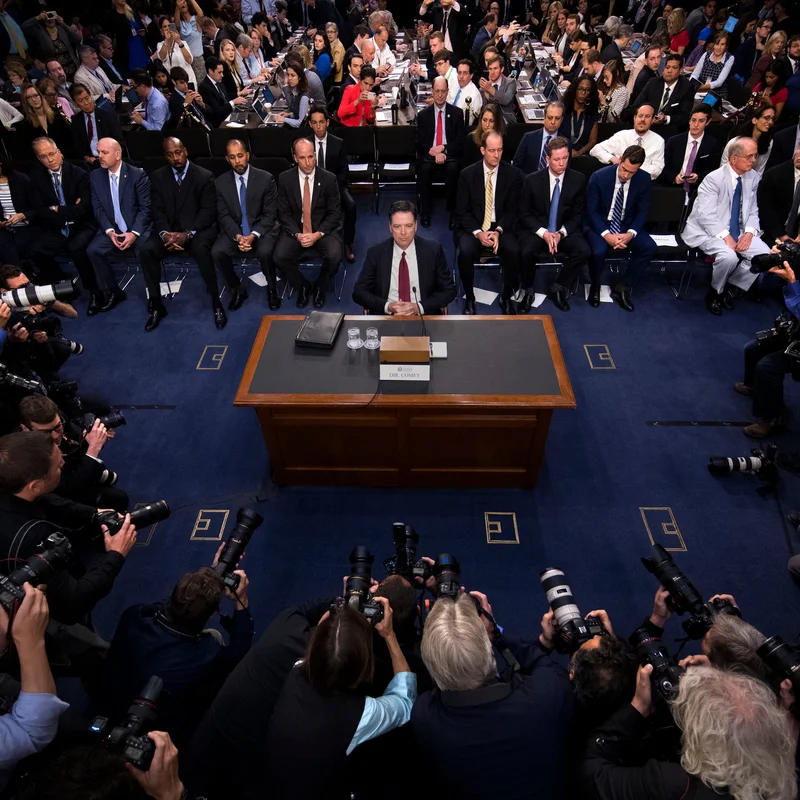In a move that has stunned legal experts and reignited debates over presidential power, former FBI Director James B. Comey was indicted on September 25, 2025—marking a dramatic escalation in President Donald Trump’s campaign of legal retribution against perceived enemies. The indictment, secured just days after Trump appointed his former personal attorney Lindsey Halligan as U.S. Attorney for the Eastern District of Virginia, signals a profound shift in how the Justice Department operates under political pressure .
Why This Indictment Is Historic
Unlike typical federal prosecutions, this case was fast-tracked after career prosecutors concluded there was insufficient evidence to charge Comey. The abrupt removal of U.S. Attorney Erik S. Siebert—who resisted the indictment—and his replacement by Halligan, a Trump loyalist with minimal courtroom experience, has raised alarms about the erosion of nonpartisan law enforcement norms .
🚨 Red Flag: The two-page indictment lacks specific evidence and was signed by a prosecutor with no prior trial experience—raising serious due process concerns.
4 Critical Takeaways from the Comey Indictment
1. Democratic Norms Were Overridden
For decades, the Justice Department operated with a firewall between political leadership and prosecutorial decisions. Trump has dismantled that barrier:
- Publicly demanded Comey’s prosecution for years
- Fired a U.S. Attorney who refused to bring charges
- Installed a personal lawyer to file the indictment
As former White House Counsel Don McGahn warned in 2018: “Strong constitutional norms of nonpolitical law enforcement should guide decision-making” .
2. Other Trump Critics Are Now at Risk
Comey is not alone on Trump’s retribution list. Potential targets include:
| Name | Role | Why Targeted |
|---|---|---|
| Letitia James | New York AG | Won $454M civil fraud case against Trump Org |
| Adam Schiff | U.S. Senator (D-CA) | Led Trump impeachment inquiries |
| George Soros | Philanthropist | Funds progressive causes; frequent right-wing target |
3. Trump’s Fury Remains Unabated
Despite a decisive 2024 re-election and sweeping policy wins, Trump remains fixated on past grievances:
- The Russia investigation (2017–2019)
- His 2023–2024 criminal trials
- The 2024 assassination attempt
He has used executive orders, lawsuits, and now federal prosecutions to punish critics—showing no signs of restraint .
4. The Legal Case Against Comey Is Weak
Experts across the political spectrum doubt the government can win at trial:
- The grand jury rejected one of three charges presented
- Career prosecutors documented insufficient evidence in internal memos
- To convict, the DOJ must prove Comey intentionally lied—not merely misspoke
- Trump’s public rants create grounds for a vindictive prosecution defense
🔍 Flowchart: How the Indictment Happened
- Trump demands Comey prosecution (2021–2025)
- Career prosecutors find no viable case
- U.S. Attorney Siebert refuses to indict
- Trump fires Siebert, appoints Halligan (Sept 22, 2025)
- Halligan presents case to grand jury (Sept 25)
- Two-count indictment issued within hours
What Comes Next?
Comey has vowed to fight the charges: “I’m innocent, so let’s have a trial” . Legal analysts predict the case may collapse before trial—but the mere indictment inflicts reputational and financial harm, a tactic Trump has long favored.
For deeper analysis on presidential overreach and the Justice Department, see our feature: [INTERNAL_LINK:trump-justice-department-political-prosecutions].
For official standards on federal prosecutions, refer to the U.S. Department of Justice’s U.S. Attorneys’ Manual.
Sources
- https://www.nytimes.com/2025/09/26/us/politics/comey-indictment-trump-takeaways.html
- https://www.nytimes.com/2025/09/26/us/politics/comey-indictment-legal-reaction.html
- https://www.justice.gov/usam
- https://www.brennancenter.org/our-work/research-reports/politicization-justice-department




